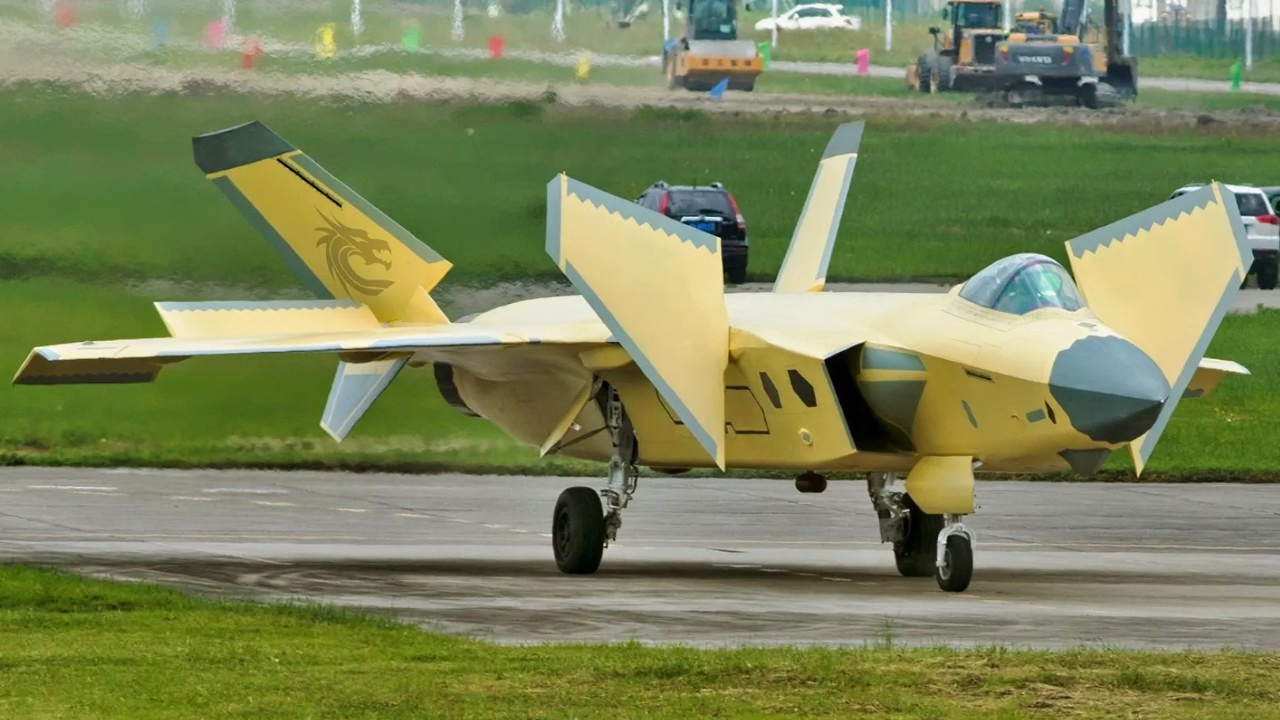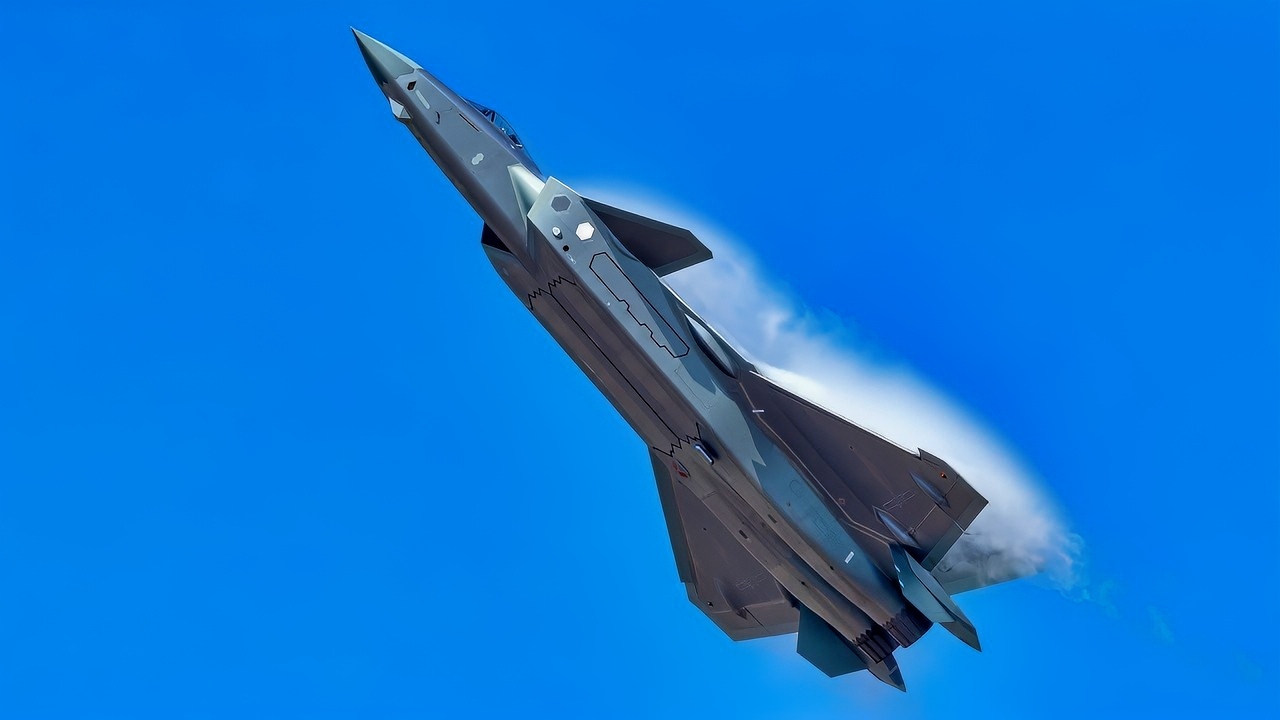Key Points and Summary – China’s PLAAF is adopting an F-35-style “beast mode” for its J-20 “Mighty Dragon,” sacrificing stealth for overwhelming firepower.
-This shift is reportedly driven by the combat success of its PL-15 long-range missile, which Pakistani J-10Cs used to score kills against Indian jets.

J-20 Fighter. Image Credit: Chinese Weibo Screenshot.
-A recently “leaked” photo shows a J-20 carrying what appears to be eight PL-15s externally.
-This configuration, which could also carry the 250-mile range PL-17, poses a significant threat to U.S. 4th-gen fighters and creates new concerns that U.S. missiles like the AMRAAM are now outclassed.
In Two Words: Beast Mode
You’ve heard the old trope that “anything you can do, I can do better.” China takes the saying seriously, especially when it comes to the efficacy of its warplanes.
The American F-35 Lightning II and the Israeli F-35I Adir have a beast mode configuration in which more weapons than normal are loaded onto the aircraft. China believes it also can achieve beast mode with its stealthy J-20 Mighty Dragon.
Indeed, the People’s Liberation Army Air Force (PLAAF) is confident the J-20’s beast mode configuration will be even better than what the Israelis and Americans achieved.
Using the F-35I Israeli Beast Mode Lessons Learned
First, the PLAAF should study Israel’s use of beast mode. The Adirs enjoyed a good war against Hamas in Gaza, and against Iran during the 12-day war in June. F-35I Adirs used Joint Direct Attack Munitions in large numbers during the attacks.

J-20 Fighter from China Mighty Dragon. Image Credit: Chinese Weibo.
The Americans have used beast mode during training flights. But the bristling configuration limits the F-35’s range, stealth, and perhaps its speed and maneuverability.
The Mighty Dragon has already set itself apart as a fifth-generation workhorse. There may be as many as 500 J-20s in the PLAAF fleet; more come online with each passing month.
The Huge Dogfight Between India and Pakistan and What It Means to the Chinese
The PLAAF usually flies the J-20 with weapons carried in internal bays, but beast mode requires external hard points and pylons.
Chinese battle planners want their J-20s to carry more beyond visual range (BVR) missiles, which were highly effective during a recent dogfight between Pakistan and India.
The Pakistanis were flying Chinese-made J-10C fighters armed with PL-15 long-range BVRs.
The Indians were flying older Dassault Rafales. The J-10C had success. The aircraft scored at least one kill with the PL-15 missiles—perhaps more, depending on which media report you read.
J-20 With Eight PL-15s?
The War Zone, doing its usual excellent job of perusing social media for news about Chinese aircraft, found a photo on X of a J-20 carrying a large number of PL-15s.
“I think we have seen this image in a smaller version already in December (second image), but now an ever clearer, larger version and a video was leaked showing a J-20 in ‘beast mode’ carrying what appears to be 8x PL-15 (?) AAMs,” according to the X account called “Rupprecht_A,” who fashions himself as a Chinese aviation expert.

China J-20 Fighter High In Sky. Image Credit: Creative Commons.
Eight PL-15s could do extensive damage to enemy warplanes, translating into eight potential aerial kills per each beast mode–enabled aircraft, and granting a significant advantage in a dogfight.
The War Zone suggests that a J-20 flying in beast mode could also carry additional PL-17 BVRs. The PL-17 has an amazing range of 250 miles—double that of the PL-15’s 125-mile range.
Fifth-Generation Fighters In Beast Mode Could Overwhelm F-15s and F-16s
The PLAAF’s J-20 pilots are likely overjoyed at the prospect of going to battle with a considerable loadout of PL-15s and PL-17s. The J-20’s beast mode could be highly effective against U.S. fourth-generation fighter jets such as the F-16 and F-15, and it could give the F-22 and F-35 a run for their money.
In beast mode, the J-20 could also carry two shorter-range PL-10 air-to-air missiles for close encounters. While Chinese pilots do not have the combat experience with beast mode to match the Israelis, the United States should take the prospect seriously. The Pakistanis had a field day with their non-stealth J-10Cs firing the PL-15; a stealthy J-20 would be much more lethal.
The Downsides of Beast Mode
However, beast mode considerably reduces stealth compared to an aircraft flying with all munitions stored in internal bays. The PLAAF is also likely to conduct more testing in beast mode to see how much speed and performance are affected by the added weight.
The Chinese BVRs are effective, and the longer-range munitions will draw the notice of anyone who takes the time to analyze the PL-15’s performance during the dogfight between the Indians and Pakistanis.
The Americans are concerned that their standard medium-range missile—the Advanced Medium-Range Air-to-Air Missile—may not be sufficient against the J-20, whether it is in beast mode or not. The U.S. Air Force is looking for a longer-range BVR.
In all, the PLAAF should be pleased. It has collected wartime data on the J-10C and its use of PL-15s. It has tested beast mode on its J-20s. The PL-17 will probably be loaded onto J-20s in beast mode, too.
I think we have seen this image in a smaller version already in December (second image), but now an ever clearer, larger version and a video was leaked showing a J-20 in “beast mode” carrying what appears to be 8x PL-15 (?) AAMs.
(Image via @人畜无害遥感星 from Weibo) pic.twitter.com/hlwI5MCiFO
— @Rupprecht_A (@RupprechtDeino) February 10, 2025
Chinese equipment may outclass American equivalents, and F-35 and F-22 pilots may need more training tailored to take on Chinese-made missiles. The J-20 in beast mode could give the PLAAF confidence as more Mighty Dragons enter the force.
About the Author: Brent M. Eastwood
Brent M. Eastwood, PhD is the author of Don’t Turn Your Back On the World: a Conservative Foreign Policy and Humans, Machines, and Data: Future Trends in Warfare plus two other books. Brent was the founder and CEO of a tech firm that predicted world events using artificial intelligence. He served as a legislative fellow for US Senator Tim Scott and advised the senator on defense and foreign policy issues. He has taught at American University, George Washington University, and George Mason University. Brent is a former US Army Infantry officer. He can be followed on X @BMEastwood.
More Military
‘Long Way from Production’: China’s J-36 Might Be ‘Paper Tiger’ Stealth Fighter
‘Mach 2’ JAS 39 Gripen Is a Rocket Fighter Plane
New ‘Ferrari’ F-35 Stealth Fighter Is Aimed Right at Russia and China
Putin’s Poseidon Nuclear “Doomsday” Torpedo Looks Like a Bluff
The Air Force’s B-21 Raider Stealth Bomber Plan Doesn’t Make Any Sense










